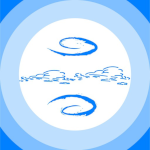19–23 Jul 2021, Virtual
Website: https://cryosphericsciences.org/vaco-21/
The 2021 Joint Assembly of IAMAS, IACS and IAPSO will be an online seminar series. This will feature presentations by the Association early career award winners for 2021 and invited speakers on the broad topics of remote sensing, field observations, modelling and coupled process of change in the atmosphere, cryosphere and oceans.
The full schedule can be found here (PDF).
Registration for this seminar series is free; registration can be reached at https://cryosphericsciences.org/vaco-21/.
You will be sent a link in advance by email to join the seminars.
The schedule of presentations:
Monday 19 July, 15:00-17:00 UTC. Remote sensing of the atmosphere, ocean and cryosphere
- Pepijn Veefkind (Royal Netherlands Meteorological Institute): The impact of COVID-19 policy measures on air quality and climate: the view from space.
- Paolo Cipollini (European Space Agency): Essential Climate Variables over oceans and ice: a view from space.
- Byongjun Hwang (University of Huddersfield): Satellite observation of the floe size distribution of Arctic sea ice: implications for sea ice models
Tuesday 20 July, 15:00-17:00 UTC. Field observations of the atmosphere, ocean and cryosphere
- Laura Stevens (University of Oxford): Stress coupling between Greenland supraglacial lakes during rapid drainage.
- Markus Frey (British Antarctic Survey): Sea salt aerosol from blowing snow above sea ice – observations, modelling and atmospheric impacts.
- Joellen Russell (University of Arizona): Designing the required Southern Ocean observing system for predicting climate change: robot floats, satellites and supercomputers.
Wednesday 21 July, 15:00-17:00 UTC. IAMAS-IACS-IAPSO Early Career Scientist Awards
- Giulia Mazzotti (WSL Institute for Snow and Avalanche Research SLF): Forest snow modelling from tree to regional scales.
- Marta Abalos (Universidad Complutense de Madrid): Human impacts on the stratospheric circulation.
- Thomas Wahl (University of Central Florida): Bigger ships or less flooding? How tidal changes affect flooding along the U.S. coast.
- Jessica Fitzsimmons (Texas A&M University): Micronutrient trace metal dynamics in the Arctic Ocean.
- David Bigelow (Minerva Intelligence): The role of englacial hydrology in the filling and drainage of an ice-dammed lake.
Wednesday 21 July, 17:00-17:30 UTC. Coupled changes and variability in the atmosphere, ocean and cryosphere
- Elizabeth Barnes (Colorado State University): Machine learning and climate projections.
Thursday 22 July, 12:00-13:30 UTC. Coupled changes and variability in the atmosphere, ocean and cryosphere
- Ruzica Dadic (University of Wellington): How much does spatial variability of the sea ice surface (SSL/snow) influence sea ice thickness?
- Matthew England (University of New South Wales): Global ocean-atmosphere climate teleconnections.
Friday 23 July, 15:00-17:00 UTC. Modelling atmosphere, ocean and cryosphere interactions
- Cécile Agosta (LSCE): Antarctic surface mass balance: local and large-scale drivers, present and future.
- Jenny Mecking (National Oceanography Centre): Predicting the 2015 North Atlantic Cold Blob.
- Doug Smith (Met Office): Robust but weak multi-model atmospheric response to future Arctic sea ice loss.
And finally… mark your calendars: The next face-to-face assembly meeting will be with the IUGG assembly meeting in Berlin, Germany in 2023.
